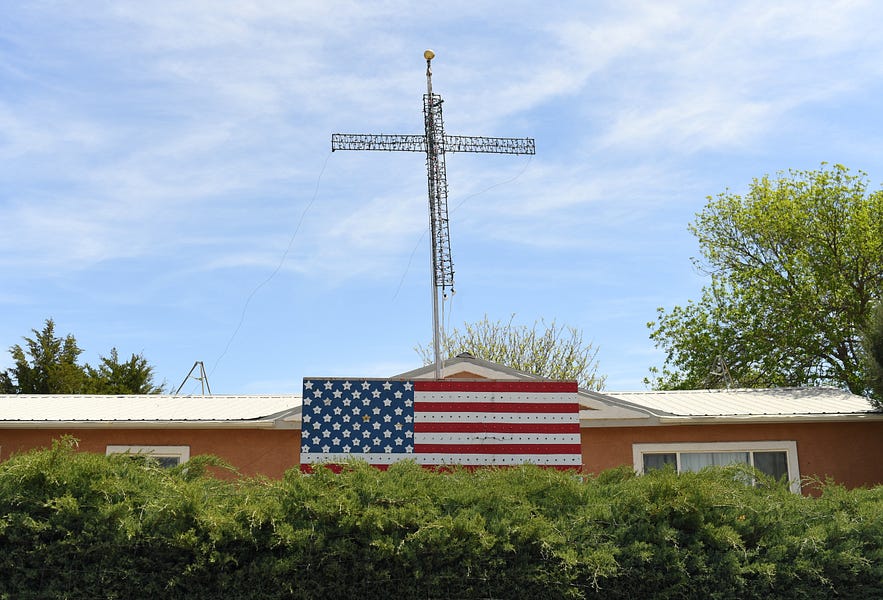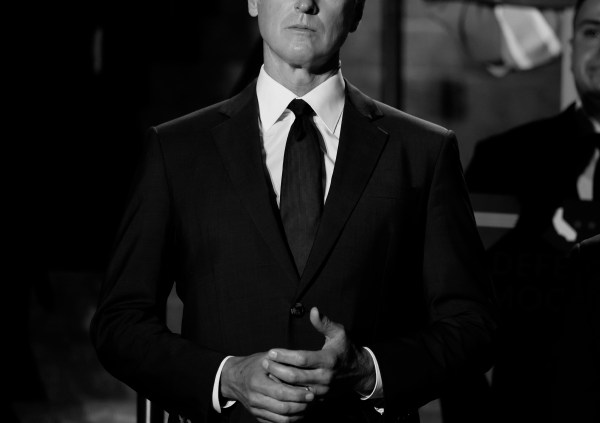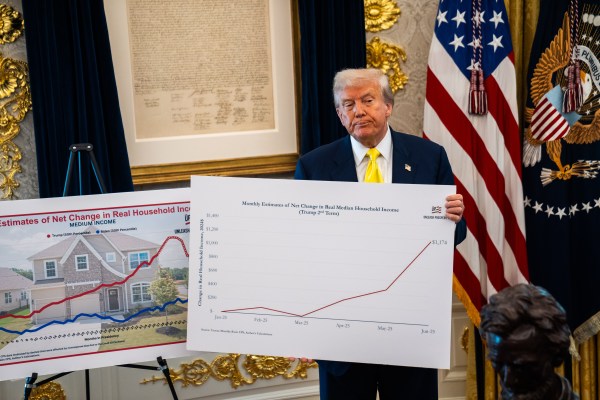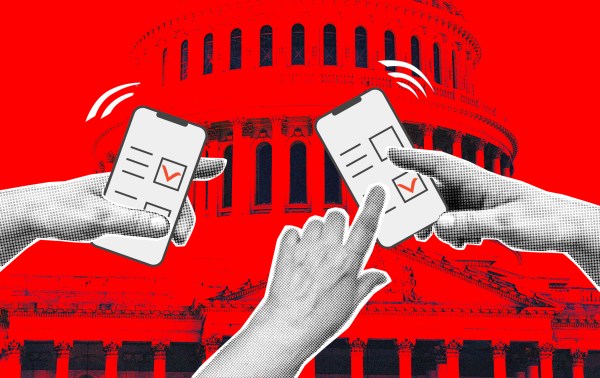As America moves out of the Trump era, I’ve got to confess that I did not expect the years of debates over Trump’s nationalism—and the difference between nationalism and patriotism—to coalesce so quickly and completely around a conversation about Christian nationalism. But that’s what happens when a wooden cross is erected not far from a wooden gallows and when praying “patriots” storm the nation’s capitol to try to stop an election and allegedly “save a nation.”
But there’s a critical problem in the debate—it’s difficult to define exactly what Christian nationalism is. To the extent one can create an academic definition, it’s hard to improve on the one Baylor University historian Thomas Kidd cites in a recent Gospel Coalition essay. He quotes Matthew McCullough’s description of Christian nationalism as “an understanding of American identity and significance held by Christians wherein the nation is a central actor in the world-historical purposes of the Christian God.”
Kidd further notes that Christian nationalism provides an “exaggerated transcendent meaning to American history” and can “undergird American militarism.” This definition helps explain, for example, the intensity around debates about American history—an intensity that sometimes causes conservative Christians to seek to amplify America’s virtues while minimizing its flaws.
But in my experience, the pervasiveness of Christian nationalism as an academic or theological concept is greatly exaggerated. Even pastors of churches that surround their property with American flags during the month of July or lead “faith and freedom” services close to Independence Day would almost certainly agree to the theological proposition that American Christians owe their allegiance to Christ over country. Explicit “patriot churches” are still thin on the ground.
Thus, I agree with Kidd. “Actual Christian nationalism,” he says, “is more a visceral reaction than a rationally chosen stance.” He provides an interesting example:
I recently saw a yard sign that read “Make Faith Great Again: Trump 2020.” I wondered, How can re-electing Donald Trump make “faith” great again? What faith? When did it stop being great? No coherent answers would be forthcoming to such questions, but that’s the point. The sign speaks to a person’s ethnic, religious, and cultural identity in ways easier to notice than to explain.
But let’s try to explain, and I’m going to explain with slippers.
Back in 2016, the pastor and teacher John Piper published an interesting answer to the question, “Should Christians be patriotic?” After all, scripture describes Christians as “sojourners and exiles” and flatly states that Christians’ “citizenship is in heaven.”
Though our ultimate identity is found in Christ and not our nationality, Piper also notes that “God means for us to be enmeshed in the world in various ways.” This is the classic, “in, but not of” formulation of the Christian life. As Piper says, “We are in the world. We are not supposed to be of the world.” But that does not preclude a “special love or affection” for your national home.
Piper referred to C.S. Lewis’s book, The Four Loves, which centers around agape (the love of God), eros (sexual love), philos (friendship), and storge (affection). Lewis locates patriotism in this last love, and he describes it as having several components, some benign and virtuous and others potentially dangerous.
For example, Lewis describes a simple love of hearth and home that also produces affection for others:
First, there is love of home, of the place we grew up in or the places, perhaps many, which have been our homes; and of all places fairly near these and fairly like them; love of old acquaintances, of familiar sights, sounds and smells … As the family offers us the first step beyond self-love, so this offers us the first step beyond family selfishness … Of course patriotism of this kind is not in the least aggressive. It asks only to be let alone. It becomes militant only to protect what it loves. In any mind which has a pennyworth of imagination it produces a good attitude towards foreigners. How can I love my home without coming to realise that other men, no less rightly, love theirs?
But Lewis recognizes that affection for country can lead to a “particular attitude to our country’s past” that has “not quite such good credentials as the sheer love of home.” After all, “The actual history of every country is full of shabby and even shameful doings … The heroic stories, if taken to be typical, give a false impression of it and are often themselves open to serious historical criticism.”
Does this sound familiar?
Then there’s the most dangerous permutation, the “firm, even prosaic belief that our own nation, in sober fact, has long been, and still is markedly superior to all others.” This belief “can produce asses that kick and bite.” “On the lunatic fringe,” Lewis warned, “It may shade off into that popular Racialism which Christianity and science equally forbid.”
Again, does this sound familiar?
But let’s get back to Piper, and to slippers. He describes our citizenship in our nation—our love of our homes—as similar to a pair of old, familiar “cultural slippers” that are just too comfortable to throw away.
But here’s the problem—we can love that comfort too much. As Piper says, “[W]e have got to be very careful about exalting our racial or ethnic or cultural patriotism or at-homeness, our slippers, to the point where we begin to demonize and actually hurt others.”
Now let’s ask a challenging question—why do we see this nationalism more in white conservative Protestant Christianity than in any other strain of American Christianity, including the Black Protestant church or the Catholic church?
I’d argue it’s because that for more than two centuries, the United States of America was quite likely the best place in the world to live if you were a white theologically conservative Protestant. No, it wasn’t a perfect place. But it was the best place. Our freedom, our prosperity and (ultimately) our power were unmatched anywhere else.
As a practical matter, our culture slippers fit so darn well that it grew all too easy to see ourselves as “in” and “of” the United States of America.
Black Christians could not feel such comfort. An enslaved person was certainly “in” America, but how could he or she feel truly “of” a land that put them in chains since the first African slaves arrived in 1619? The same analysis applies to those who suffered under Jim Crow. And while theologically conservative Catholics and Protestants now often lock arms in the modern American culture war, that would have been unthinkable in the days when anti-Catholic Blaine Amendments stalked the land.
So for generation after generation, many millions of fellow believers in Jesus Christ could quite keenly feel that they were still—to greater and lesser degrees—“sojourners and exiles” in the land of their birth. They didn’t have to struggle to understand “in but not of.” They lived that reality each and every day. Their cultural slippers did not fit quite like mine.
And here’s the convicting reality that I’ve had to confront. If fellow believers—if fellow citizens—struggled to overcome poverty or discrimination or injustice, then perhaps I shouldn’t have felt quite so comfortable. I shouldn’t have felt quite so proud. Perhaps I should even wonder if some of my security and comfort had come at their expense.
Moreover, there’s also a slowly-dawning realization that if I want my fellow citizens to feel more comfortable—to feel less like sojourners and exiles—then my slippers may just have to feel less snug. An expansion of American liberty and prosperity will inevitably mean both a change in American culture and a change in the understanding of America’s past.
I love this country, but I love it with eyes wide open. The aspirations of our founding have long been tempered by the brutal realities of our fallen nature. The same nation that stormed Normandy’s beaches to destroy a fascist empire simultaneously sustained a segregationist regime within its own borders. Our virtues do not negate our vices, and our vices do not negate our virtues. America isn’t 1619 or 1776. It’s 1619 and 1776.
What is Christian nationalism? It’s a deep emotional attachment to a particular and exclusive culture, a skewed version of history, and a false sense of “marked superiority” that must and will fade away.
What is Christian patriotism? To echo C.S. Lewis and George Washington, it’s a love of home and place and neighbor that does its best to fulfill the vision of peace and justice articulated by the prophet Micah so many long years ago—“Everyone will sit under their own vine and under their own fig tree, and no one will make them afraid.”
One last thing …
I received such an overwhelmingly positive response to Ellie Holcomb last week that I thought I’d include one of my favorites. I’ve had multiple conversations this week with people who see no clear path through our national darkness. The hope in this song rebukes our fear:







Please note that we at The Dispatch hold ourselves, our work, and our commenters to a higher standard than other places on the internet. We welcome comments that foster genuine debate or discussion—including comments critical of us or our work—but responses that include ad hominem attacks on fellow Dispatch members or are intended to stoke fear and anger may be moderated.
With your membership, you only have the ability to comment on The Morning Dispatch articles. Consider upgrading to join the conversation everywhere.